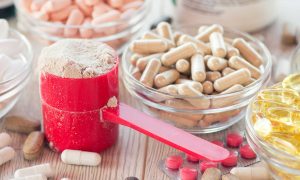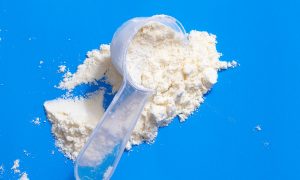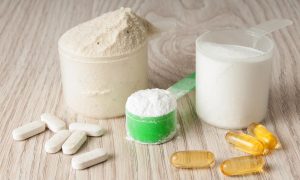Top 8 supplements for football players

|
|
Good ole gridiron football is one of the most popular sports in the entire world, and it is arguably the most popular in all of the US, and if you’re familiar with it, you’ll know that the athletes themselves are absolute beasts. Not only are they amazing athletes that are big and strong, but they are also flexible and are deceptively fast. Football requires explosive strength and power, and although many of the athletes involved do have god-given talent, in order for them to really take their athletic performances to the next level, they need to work their butts off in the gym, and indeed on the playing field itself. Not only do they need to train incredibly hard, but on top of that, they also need to watch their diets. Whilst football players are not judged by their physiques, many of them do have significant amounts of muscle, and relatively low levels of body fat. Some are shredded, some are big and bulky, and some are a combination of both. One thing that is for certain however, is that due to gruelling nature of their training regimes, and of the game itself, supplementation is pretty much essential if a football player really wants to bring out their absolute best. Here’s a look at 8 of the top supplements for football players.
Whey protein
Starting off with the most obvious, we have whey protein. Whey protein is a derivative of cow’s milk, and it is formed basically when the milk begins to turn into cheese, where it separates into solids and liquids. The solids are known as the curds, whereas the liquid is known as the whey. Once the whey is extracted, it then undergoes a series of processing and filtration and processes, eventually leaving you with the powdered supplement that you are familiar with to this day. Whey protein is ideal for a football player because it assists with the growth and repair of muscle tissue. Football players obviously need to be big and strong because they have to manhandle 300 plus men around on the field, plus they need to be heavily muscled in order for them to absorb the punishment that they take. What’s more, not only does the protein assist with muscle growth, it also assists with muscular repair, which enables them to recover after gruelling games and training matches. Whey protein supplements can be in concentrated form, or isolate. Concentrate is usually around 80 – 85% pure protein, whereas isolate is 90 – 95% pure protein. For this reason, the whey isolate is the better choice, although whey concentrate will still do the job, you just need to be wary of the additional fats and carbohydrates.

Creatine
Creatine, usually creatine monohydrate, is another supplement that is hugely popular amongst athletes and bodybuilders, and for good reason. Creatine is a type of naturally occurring amino acid that is present in our own bodies. Sadly the amounts that we can synthesize naturally are not large enough to be able to improve our athletic performances, which is why supplements are so essential. Creatine is beneficial for football players, and indeed for other athletes, due to the fact that it has been found to increase natural energy stores and improve muscular function. The muscles rely on a key source of energy known as Adenosine Tri Phosphate, or ATP for short. The more ATP that is present, the harder the muscles can work. By supplementing with creatine, we are able to increase ATP reserves, and can therefore improve muscular function as the more energy they have, the harder they can work, both in the gym, and on the football field.
BCAAs
BCAAs, or Branch Chain Amino Acids, are made up of three amino acids: Leucine, Valine, and Isoleucine. BCAAs have been found to play a vital role in protein synthesis, which is where the body naturally synthesizes new muscle proteins when existing muscle tissue becomes damaged during strenuous exercise. Amino acids are the building blocks of protein molecules, and by consuming BCAAs, you are giving your muscles exactly what they need. Leucine in particular, plays a vital role in post-workout recovery as it initiates protein synthesis at the most rapid rates. Put simply, BCAAs will not only help to provide sustained energy whilst you train if sipped intra-workout, but when consumed following your workout, they will assist with post-workout recovery.
L-Tyrosine
L-Tyrosine is a form of amino acid that is especially beneficial for football training, especially for times when you just can’t seem to get your head into the game. Basically, L-tyrosine functions as a precursor to adrenalin itself, and has been found to block the effects of tryptophan found in the body. Tryptophan is a neurotransmitter that is responsible for making us feel tired and sleepy. Whilst it can be beneficial to feel tired and sleepy late at night, when you’re trying to bust your butt in the gym, or on the playing field itself, you need to feel alert, invigorated, and revitalized, which is why L-Tyrosine is so beneficial. For times when your brain, and your body, need a bit of a pick me up, it is ideal, especially when stacked with the next supplement on our list.

Caffeine
Caffeine is a natural stimulant found primarily in tea leaves and coffee beans. In those plants, it functions as a self-defence mechanism because it acts as a pesticide to prevent the plants from being eaten by bugs. It is perfectly harmless in humans however (as long as the recommended daily dosage is not exceeded) as it provides stimulating effects that wakes the Central Nervous System up and makes us feel alert, physically and mentally. When stacked with L-Tyrosine, and other stimulating supplements it is absolutely perfect when consumed around 45 minutes before physical exercise.
Fish oil
Fish oil supplements are truthfully not only beneficial for athletes, but they are beneficial for everybody and anybody if truth be told (providing they don’t suffer with fish allergies). Fish oil supplements for football players however, are essential, due largely to its natural anti-inflammatory properties. You see, every time you are training, every time you are lifting weights, and every time you are training, you are putting your body through stress, which creates inflammation. Inflammation can reduce mobility and flexibility, it can limit range of motion, and it can cause general aches and pains. The more inflamed your body is, the more pain and discomfort you will be, and the less efficient an athlete you will become. When training and playing football, you will want to be as close to 100% as you can possibly be, and if you are sore and aching, unfortunately this will not be possible. Fish oil however, provides anti-inflammatory properties that helps to lubricate the joints and reduce inflammation in the muscles, joints, cartilage, and tendons. What’s more, fish oil supplements are also packed full of essential fatty acids that strengthen the heart, that boost brain health and power, and that help to increase the metabolism, resulting in more energy.

Multivitamins
In terms of general health and well-being, multivitamins are absolutely essential. Multivitamins are comprised of a series of vitamins and minerals, each of which will provide unique benefits to the human body. This is very much a base supplement that promotes overall health and well-being, and whilst it may not provide hugely noticeable improvements in your football playing and training abilities, it will still benefit you. The main reason for this is simply the fact that multivitamins will help to increase your immune system and will help make you fitter and healthier. The fitter and healthier you are, the better you will be when it comes to training and playing football. To perform at your best, you need to be nourishing your body with the best supplements and ingredients, so make sure you include a multivitamin as part of your daily supplement stack.
Zinc
Finally, the last supplement on our list today is Zinc. Zinc is an essential trace mineral that is considered to be one of the most anabolic natural supplements in the world today. Zinc has been proven to assist with the production of anabolic hormones such as HGH (Human Growth Hormone) and testosterone, both of which play vital roles in muscle growth and repair. Testosterone in particular, has been linked with increases in strength, muscle mass, recovery, and athletic performance, so from an athletic perspective, supplementing with zinc is a no-brainer. Zinc also boosts brain health by strengthening neurons and neurotransmitters, helping to keep you alert and firing on all cylinders. What’s more, when combined with magnesium, it can promote a good night’s sleep, which is incredibly important as we do 90% of our recovering whilst we sleep.














